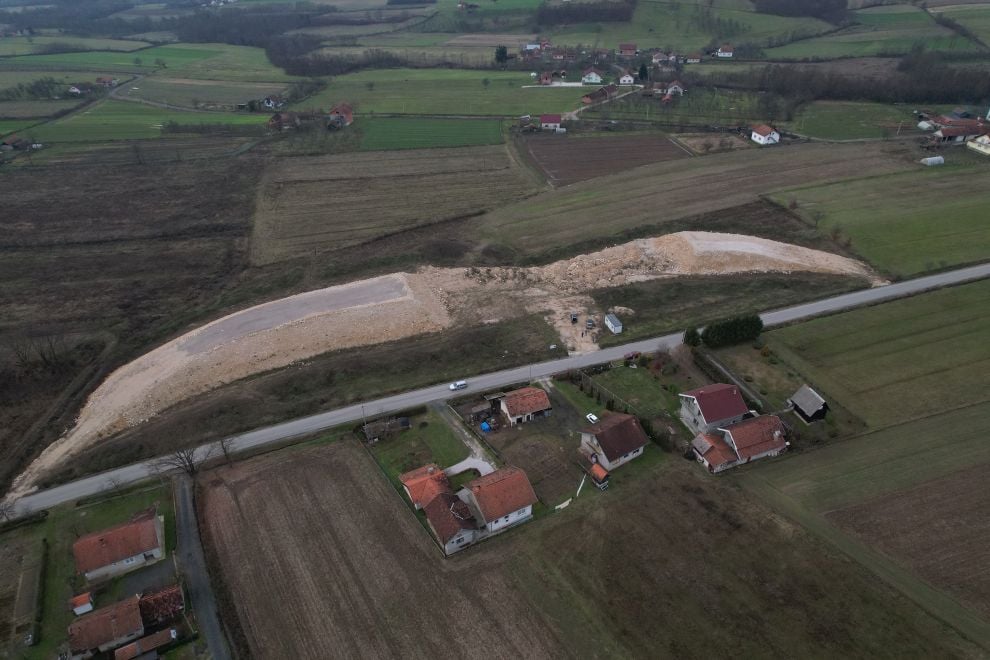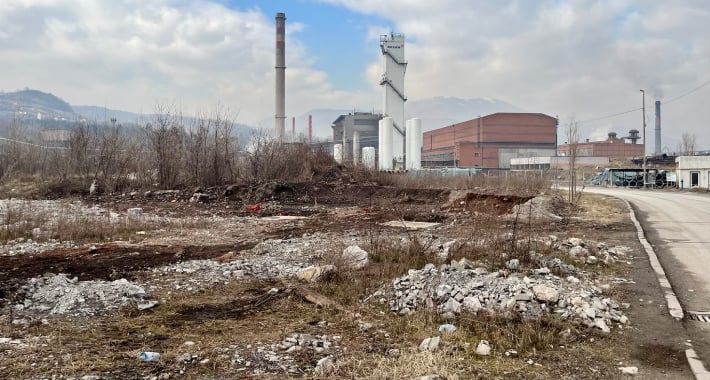Žurnal in English
CHINESE INVESTMENTS IN BIH: Lucrative ventures characterized by controversial loans, lack of transparency and suspicions of corruption
While Chinese investments in countries in the European Union have been decreasing year by year, investments and loans from China to Bosnia and Herzegovina have notably increased since 2019. As the EU implements stricter rules for scrutinizing Chinese companies' investments, there are hardly any controls in Bosnia and Herzegovina, making the Chinese one of the favourite business partners. The primary interest of China is economic, but there are claims that Chinese economic investments are closely intertwined with politics. Controversies, suspicions of corruption and favouritism, lack of transparency, delays, activist protests, and failed projects... all of these characterize Chinese projects in both entities of Bosnia and Herzegovina.

Chinese Investments in the European Union and the United Kingdom have seen a significant decline in recent years. According to a report by Rhodium and MERICS, in 2022, Chinese direct investments in Europe reached their lowest level in the past decade, amounting to 7.9 billion euros, which is 83 per cent less than the peak in 2016.
On the other hand, when it comes to Bosnia and Herzegovina, it is noticeable that investments and loans from China have dramatically increased after 2019. According to data from the China Global Investment Tracker research conducted by the American Enterprise Institute and the Heritage Foundation, around three billion dollars were invested in Bosnia and Herzegovina - investments worth 610 million dollars from 2019 to 2021, and 2.44 billion dollars in Chinese loans from 2010 to 2022.
For comparison, while Chinese investments and loans in Bosnia and Herzegovina have been strongly increasing since 2019, the European Union introduced stricter rules for scrutinizing Chinese companies' investments precisely in that year.
Chinese investments in the infrastructure of the Western Balkans have been problematized in an analysis by the European Union Institute for Security Studies (EUISS). In this analysis, which is a few years old, it was emphasized that Chinese investments exacerbate the already widespread corruption in the region, including Bosnia and Herzegovina.
Chinese investments and loans in Bosnia and Herzegovina are primarily targeted towards the transportation, energy, and metal sectors. They are often accompanied by controversies, suspicions of corruption and favouritism, lack of transparency, delays, and activist protests. Some interpretations suggest that these investments are more like conventional borrowing that will ultimately be repaid by taxpayers rather than genuine investments. Additionally, certain announced Chinese projects have ended in failure.
It is essential to note that Chinese businesses operate in both entities of Bosnia and Herzegovina, and most local experts agree that China's interest in our country is primarily economic. However, some argue that Chinese economic investments are intertwined with politics, and this can be seen as a way for China to exert political pressure or establish a political foothold.
Chinese loans are particularly contentious for economists. Why? Past practices have shown that China demands countries it lends to keep the loan terms confidential, which led to instances in Greece and Montenegro where the public only found out later that, in the event of loan default, China could claim ownership or the right to use state assets from these countries.
Therefore, the lack of transparency is the most significant issue, and the public remains deprived of crucial information about the terms and guarantees for Chinese loans. This lack of transparency can even benefit local, mostly corrupt politicians, according to some opinions.
OPAQUE DEALINGS WITH SUSPICIOUS COMPANIES
When Chinese projects in the Bosnian entity of Republika Srpska are mentioned, the first thing that comes to mind is Vuk Hamović, a Serbian electricity trader and the owner of the international company EFT, and his collaboration with Chinese partners.
His investment in the Stanari Thermal Power Plant stands out, where a significant portion of the funds was secured through credit from the China Development Bank. All of this was accompanied by questionable decisions by the authorities in Republika Srpska, and according to media reports, the entity's budget was damaged by at least 100 million convertible marks.
The project was carried out by the Chinese company Dongfang Electric International Corporation (DEC), which appears as Hamović's partner in the construction of the Bileća solar power plant, with a total value of 43.5 million euros. This project has also been controversial because, as reported by journalists, the concession for the solar power plant was allegedly tailored for Hamović.
Media have previously reported on the increasingly close connections between this company and the authorities in Republika Srpska. What is even more significant is that, according to media reports, in 2015, DEC, along with five other state-owned companies, was the subject of an investigation by China's main anti-corruption agency, which found that company leaders were involved in bribery. There have been allegations of political ties with this company from other businesses related to allegedly rigged tenders in South Africa.
The level of secrecy and lack of transparency in Chinese projects is perhaps best exemplified by the construction project of the Dabar Hydropower Plant, as reported by Žurnal.
To briefly recap, the idea has been around for decades, and it was decided that the project would be financed through Chinese loans, with construction carried out by Chinese companies. The tender, worth 131 million convertible marks, was won by the Chinese company China Gezhouba Group Corporation (CGGC) in 2016.
The whole project has been plagued by delays and a lack of transparency from the very beginning. Since 2019, the authorities in Republika Srpska have been announcing the arrival of Chinese workers and the start of construction, but that did not happen until the end of April 2023 when Žurnal journalists visited the construction sites. Even the Prime Minister of this entity, Radovan Višković, visited China in early April to discuss ways of financing the construction of the Dabar Hydropower Plant, among other things.
Another example of absolute non-transparency is the construction of the Banja Luka - Prijedor highway. The highway, around forty kilometres long and worth about 297 million euros, is being built by the Chinese company Shandong Hi-Speed International (SDHS).
However, despite numerous requests and the fact that it is in the public interest, the details of the concluded contract between the RS Government and this company have never been disclosed to the public. What is known, and as Prime Minister Višković has already stated, is that the concession agreement was signed in mid-December 2018, and RS will pay an annual fee of 30 million convertible marks for the availability of the highway.
In addition to the contract being in favour of Chinese investors, journalists have also raised concerns about other suspicious details, one of which is that the RS Government bought and then sold the land to the Chinese company through which the new highway will be constructed. Once again, the public was not informed about the details regarding the land transactions.

Here's another example: In 2014, Autoputevi RS signed a preliminary agreement with the Chinese state-owned company Sinohydro Corporation Limited for the construction of the Banja Luka-Mlinište highway. A commercial contract was also signed, and the entire project was supposed to be financed by the Chinese Exim Bank. However, to this day, there have been no significant advancements in the realization of this project. Once again, the public was kept in the dark regarding the project details.
A 102-million-euro contract for the construction of three small hydropower plants on the Bistrica River was entrusted to the Chinese National Aero-Technology Corporation for International Engineering (AVIC-ENG). The investor in this project is the company Hidroelektrane na Bistrici, a subsidiary of Elektroprivreda RS.
According to media reports, this company is on the list of entities in which American citizens and companies are prohibited from investing. Moreover, the project of constructing the hydropower plants on the Bistrica River is also controversial from an environmental perspective. Activists and locals claim that, for example, the baseline environmental status has not been adequately determined, which consequently renders the environmental impact assessments, approved by the ministry, inadequate and not in compliance with the law.
Due to the construction of the hydropower plants, as mentioned, a total of six administrative lawsuits have been filed – three against the environmental impact assessments and three against the construction permits for these projects. According to the latest information, one lawsuit against the construction permits has been accepted.
The collaboration with China is expected to further elevate in the upcoming period, as the Republika Srpska government recently decided to establish a representation office in China. "The Representation of Republika Srpska in the People's Republic of China, with headquarters in Shanghai, is being established", stated in the decision signed by Prime Minister Radovan Višković.
It is evident that the authorities of this entity in Bosnia and Herzegovina are increasingly turning to China, and according to economist Svetlana Cenić, the reason is simple – lack of funds:
"They are turning to anyone from whom they could get money, and on the other hand, China is an excellent leverage against the West to say, 'Look, we behave as we please, we don't care about anything, we offend, block, but give us the money.' It's an excellent way to say, 'If you don't provide it,' meaning the West, 'we'll go to the Chinese.'"
FAILED ENERGY PROJECTS
Chinese loans and investments are acceptable to the authorities of the other entity in Bosnia and Herzegovina, as well as to the cantonal authorities.
The lack of transparency when it comes to projects involving Chinese companies is not a coincidence, as evidenced by an example from the capital city. The Ministry of Transport of Sarajevo Canton labelled a contract worth over 40 million convertible marks for the reconstruction of the tramway track in Sarajevo as confidential, as reported in mid-2022.
Recall that in June 2021, the Sarajevo Canton Government awarded a contract worth 20.4 million euros to a consortium of Chinese companies - China Shandong International Economic & Technical Cooperation Group (Shandong) and China Railway No.10 Engineering Group Co. (CREC 10). To make matters worse, the company CREC was associated with a series of accidents that resulted in injuries or fatalities of workers!
Experiences in doing business with the Chinese are also present in Elektroprivreda BiH. Let's remember the project to build Block 7 in the Tuzla Thermal Power Plant, which has been practically on hold for 17 years and many claim it has long been failed. The construction was supposed to be carried out by a consortium of Chinese companies China Gezhouba Group (CGGC) and China Energy Engineering Group, Guangdong Electric Power Design Institute (GEDI).
From the very beginning, it was evident that the project would not be completed. The Government of the Federation of Bosnia and Herzegovina and Elektroprivreda BiH did not want to give up even when they were warned by the European Union that the construction of Block 7 in Tuzla was not economically and environmentally sustainable. They did not back down even when the key subcontractor General Electric withdrew in October 2020, and no alternative solution was found. Moreover, Elektroprivreda BiH based its business plan for the period 2023-2025 on this investment.

The scale of this project is best demonstrated by the figures. The total estimated value was around 786.3 million euros, with the main source of funding intended to be a 614 million euros loan from the Export-Import (EXIM) Bank of China, guaranteed by the Federation of Bosnia and Herzegovina Government.
Some, such as the Energy Community, interpreted this guarantee as unauthorized state aid, alleging that the Federation of Bosnia and Herzegovina Government put Elektroprivreda BiH in a more favourable position compared to other participants in the same business.
The most significant problem is that Elektroprivreda BiH has already spent around 300 million convertible marks on this project, of which 214 million was paid as an advance to the Chinese consortium. Despite everything, neither Elektroprivreda BiH nor the Chinese side formally gives up on the project, probably out of fear of lawsuits, turning Block 7 into a "captive project".
If there is no Block 7, there is the revitalization of Block 6, and there are still Chinese companies that are evidently very interested in energy projects in Bosnia and Herzegovina. Not long ago, the Bosnian-Chinese consortium consisting of the Zenica ITC, the previously mentioned controversial company DEC, and Dongfang Boiler, EP BiH awarded a contract worth 29.7 million convertible marks for the revitalization of Block 6 boiler.
DEC, which faced accusations of corruption and rigged tenders, was also chosen as the strategic partner for the construction of a 350 MW power plant in Banovići. However, this 405-million-euro investment, which was supposed to be financed by Chinese loans, was halted due to political upheaval within the SDA party.
The infamous project for the construction of the Zenica Thermal Power Plant, worth 500 million convertible marks, which was supposed to bring in Chinese investors through a contract signed in 2013, also failed. This project was supposed to be one of the first Chinese investments in Bosnia and Herzegovina.

In recent times, the Chinese have shown interest in other projects as well. It has been reported that the Chinese are extensively processing and exporting timber from Bosnia and Herzegovina, and at least three sawmills in the areas of Brčko and Pelagićevo have been leased by Chinese nationals who cut and pack the timber in containers for further export to their home country. The ban on exporting logs is being circumvented through the export of processed timber.
Information from the beginning of the year indicates that the Service for Foreigners' Affairs of Bosnia and Herzegovina has granted 377 permanent residence permits and 1,498 temporary residence permits to Chinese citizens in the last five years, with as many as 413 permits approved just during the previous year.
While, as mentioned before, the European Union has implemented stricter investment screening rules for Chinese companies since 2019, it appears that different rules apply in Bosnia and Herzegovina. Data from January shows that in the past five years, inspectors from the Republika Srpska entity have only inspected one Chinese company in the region, and the only deficiency they found was the absence of a Risk Assessment Act for jobs.
 SKRIVENI UGOVORIKineske firme rade bez kontrole
SKRIVENI UGOVORIKineske firme rade bez kontrole
(zurnal.info)










